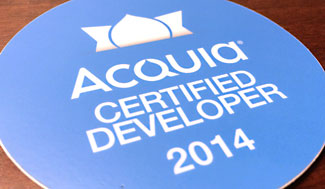I wanted to post this here, since this is more of my sounding board for the Drupal community, but the details are on my personal blog: starting October 6, I will be working for Acquia as a Technical Architect in their Professional Services group!
What does this mean for this site/blog, Hosted Apache Solr, and Server Check.in? Not much, actually—they will continue on, likely at the same pace of development they've been for the past year or so (I'll work on them when I get an odd hour or two...). I am still working on completing Ansible for DevOps, and will actually be accelerating my writing schedule prior to starting the new job, since I'll have a little wedge of free time (a.k.a. unemployment!) between Mercy (my current full-time employer) and Acquia.
I'm excited to start working for Acquia, and am also excited to be able to continue doing what I love—working on Drupal, working on Solr, working on Ansible/infrastructure, and working in their respective communities.




